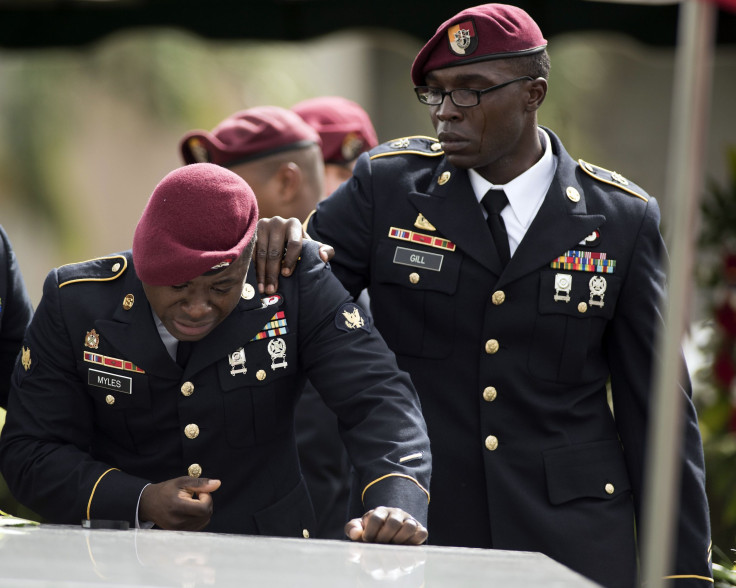US Soldiers Died In Niger Due To Poor Training, Pentagon Report Concludes

A month-long military investigation into the ISIS ambush in Niger last October found “individual, organizational, and institutional failures” led to the deadly attack, which claimed the lives of four U.S. soldiers — Staff Sgt. Bryan C. Black, Staff Sgt. Jeremiah W. Johnson, Staff Sgt. Dustin M. Wright and Sgt. La David T. Johnson.
Apart from the four, five Nigerian soldiers were killed and eight Nigeriens and two Americans were wounded when a group of armed Islamic State militants attacked them in Tongo Tongo, Niger, on Oct. 4 while they were returning to base after a mission.
An eight-page report, released by the Pentagon on Thursday, listed insufficient training, lack of rehearsals, poor planning and command mistakes as reasons that resulted in the deadly incident. It said the soldiers “did not conduct pre-mission rehearsals or battle drills with their partner force [Nigerien soldiers]” prior to the mission.
As part of the investigation, the team “examined documentary, photographic, audio, video, and testimonial evidence to make findings of fact. It interviewed 143 witnesses, including survivors of the attack, one of whom accompanied the team back to the battlefield to explain what happened during the 4 October 2017 incident.”
The probe team, however, said "no single failure or deficiency was the sole reason for the events."
The report also states the mission didn't get required senior command approval. On Oct. 3, two junior officers "inaccurately characterized the nature of the mission" to get approval from a higher ranking officer for an operation targeting a local ISIS leader. The officials did not inform about this mission to the higher-ups and instead, a much lower risk mission was submitted and approved, it added.
"The initial concept of operations submitted for this mission was not approved at the proper level of command," the report stated.
However, Maj. Gen. Roger Cloutier, who led the Pentagon probe, said Thursday it "wasn't a deliberate intent to deceive.”
Speaking to journalists at the Pentagon on Thursday, U.S. Africa Command (Africom) head Marine Corps Gen. Thomas Waldhauser said necessary changes were made following the incident to make U.S. forces deployed in Africa safer.
“We are now far more prudent in our missions," said Waldhauser. "The missions we actually accompany on have to have some type of strategic value in terms of the enemy we're going against.”
“I will ensure that lessons learned [from the incident] are communicated to all levels within Africom as well as within the component commands, and integrate these changes into our daily operational activities. I take ownership of all the events connected to the ambush of 4 October. Again, the responsibility is mine,” he added.
Speaking about lack of training, he said: “In an operation where you're under enemy contact, you need to be able to operate like clockwork without having to speak because you know the drills. In this particular case, the team did not conduct those basic soldier level skills that would, that are really necessary to go on an operation such as this.”
© Copyright IBTimes 2024. All rights reserved.











